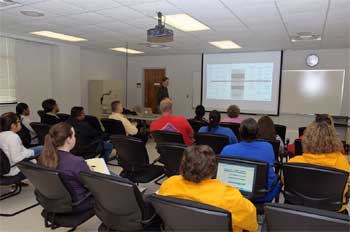A LaserFest Teachers’ Day: Outreach to Local Science Teachers at the SESAPS Meeting
Amber L. Stuver
It isn’t everyday that physicists gather in a teacher’s region to discuss their profession. When meetings and conferences like this do take place, it is an exceptional time for us to reach out to the educators in that area to share our expertise in physics with them and to learn what challenges they face in preparing the scientists of tomorrow.
When I was asked to help with the local organizing of the Southeast Section APS (SESAPS) Meeting, I immediately wanted to organize an outreach event for teachers much like the Teachers’ Days that take place at the APS March and April Meetings. With 2010 being the 50th anniversary of the laser and the LaserFest celebrations taking place across the country, this was the perfect topic for a LaserFest Teachers’ Day.
I first turned to the APS Outreach Department and inquired about getting 30 of the 2009 PhysicsQuest classroom kits that featured comics with the new laser superhero, Spectra. They agreed to supply me with these kits. Because of this, the participating teachers not only received training and interaction with physicists but they also received supplies to take back and use in their classrooms.
With the topic and materials accounted for, I sought financial support to fund expenses for a breakfast for the teachers and a lunch with scientists, where the teachers got to informally interact with physicists attending the SESAPS Meeting. The FEd helped to fund this effort through their Mini-Grant program that seeks to fund outreach efforts that target K-12 teacher professional development events. The AAPT also supported this event financially and extended certification to this workshop so participants could option to earn National Continuing Education Units (http://www.aps.org/programs/education/teachers/teachers-days/aapt.cfm). Finally, the Optical Society of America (OSA) also financially supported this Teachers’ Day as well as providing outreach materials.

Dr. Ken Schafer presents a lection on lasers to the teachers. Photo by J. Giaime.

A teacher explores the diffraction pattern produced by a piece of fabric. Photo by J. Giaime
The LaserFest Teachers Day took place on 23 October 2010 (the last day of the SESAPS Meeting) on the Louisiana State University (LSU) campus in Baton Rouge. The LIGO Science Education Center provided the staffing, including myself, for this event. About 20 teachers from 7 parishes attended and ranged from middle school to high school science teachers at all experience levels.
After breakfast, Dr. Ken Schafer (an Atomic, Molecular, and Optical professor at LSU) presented a lecture on the history of lasers, what makes laser light special, and how lasers are used in our everyday lives and in physics research.
When working through the PhysicsQuest classroom kit (which included activities on diffraction, polarization and phosphorescence), each activity was introduced with an explanation of the science being dealt with and going through the accompanying worksheets from the students’ points-of-view (i.e. how they thought the students would answer the questions before doing the activity versus what the correct answers were). Since all of the activities were hands-on, special attention was also paid to the scientific method and the importance of determining correct physical outcomes through inquiry.
At lunch, several physicists attending the SESAPS Meeting joined us and had lunch with the teachers and had informal discussions. The conversations were a productive two-way discourse ranging from information on a physicist’s research and teaching in the college classroom to teachers discussing the challenges they have in their classrooms.
By the end of the day I believe that I learned as much about the real-life challenges that teachers encounter in their day-to-day careers as the teachers learned from the presentations. In the evaluation of the day, teachers expressed their appreciation for workshops that provide them with classroom materials, especially those that are hands-on and their desire for more workshops like this regardless of the theme.
If you are interested in organizing a Teachers’ Day like this, the APS has assembled a web page with information they’ve refined from planning workshops like this at http://www.aps.org/programs/education/teachers/teachers-days/manual.cfm. And if you are organizing an event that focuses on K-12 teacher preparation, please consider applying for a FEd Mini-Grant.
Amber Stuver is a postdoctoral scholar at the LIGO Livingston Observatory where she works with their Science Education Center as well as performing traditional gravitational wave research. She also serves the APS as an APS/AAPT Member-at-Large on the FEd Executive Committee, is the Councilor for the FGSA and is a member of the APS Executive Board. Amber writes an outreach blog about working as a physicist (www.livingligo.org) and can be contacted at stuver@ligo-la.caltech.edu.
Disclaimer—The articles and opinion pieces found in this issue of the APS Forum on Education Newsletter are not peer refereed and represent solely the views of the authors and not necessarily the views of the APS.
